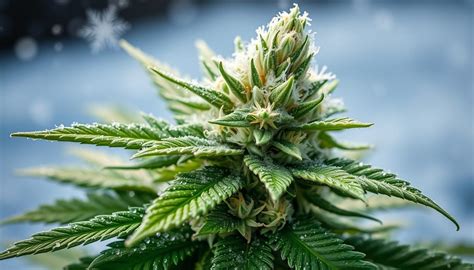In the ever-evolving world of cannabis, few strains capture the imagination quite like Ice Caps Weed. This hybrid marvel, often hailed for its potent effects and visually striking appearance, has become a favorite among enthusiasts seeking a balanced high with a touch of indulgence. Derived from a genetic cross between Ice Cream Cake and Blue Power, Ice Caps boasts a composition of 35% sativa and 65% indica, delivering a THC content that typically hovers around 20%. Its buds are dense, frosted with trichomes that give it a snowy, icy look—hence the name. Users report a euphoric uplift followed by deep relaxation, making it ideal for evening unwinding or creative pursuits. But beyond its sensory appeal, the real intrigue lies in its legal standing, which mirrors the broader cannabis landscape fraught with contradictions and progress. As of August 2025, with cannabis legalization sweeping across jurisdictions, understanding where Ice Caps fits in is essential for consumers, growers, and businesses alike.
Decoding the Strain: Potency, Effects, and Cultivation Insights
Ice Caps Weed stands out not just for its heritage but for its versatile applications. Breeders have crafted this strain to thrive in both indoor and outdoor settings, with a flowering time of about 8-9 weeks, yielding moderate to high harvests under optimal conditions. Its flavor profile blends sweet vanilla notes from Ice Cream Cake with earthy, piney undertones from Blue Power, creating a smooth smoke that’s both palatable and memorable. For those exploring enhanced versions, products like THCA Ice Caps—premium buds coated in 99% THCA isolate and infused with liquid diamonds—amp up the potency, pushing THC equivalents into the 30-40% range. This makes it a go-to for experienced users chasing intense euphoria and pain relief. Cultivation-wise, it’s moderately easy, resistant to common pests, and adaptable to hydroponic systems. However, its legal cultivation depends entirely on regional laws, highlighting the need to navigate regulations carefully to avoid pitfalls.
The Federal Freeze: U.S. National Policy on Cannabis
At the federal level in the United States, cannabis, including strains like Ice Caps Weed, remains classified as a Schedule I substance under the Controlled Substances Act, deeming it to have no accepted medical use and high abuse potential. This stance persists despite ongoing debates and proposals for rescheduling. In 2025, discussions around the Secure and Fair Enforcement Regulation (SAFER) Banking Act and the States Reform Act aim to decriminalize marijuana and establish a regulatory framework led by states. Yet, as of now, federal prohibition means interstate transport is illegal, and financial institutions often shy away from cannabis businesses. Figures from the DEA indicate that while enforcement has softened— with seizures dropping 15% from 2023 to 2024—possession can still lead to fines or imprisonment. This federal chill contrasts sharply with state-level thaws, creating a patchwork that confuses consumers and stifles industry growth.
Statewide Thaws: Where Ice Caps Weed Blooms Legally
Diving into state specifics, as of June 2025, 40 states, three territories, and the District of Columbia permit medical cannabis use, while 24 states allow recreational consumption. In recreational havens like California, where adult-use was legalized in 2016, Ice Caps Weed can be purchased from licensed dispensaries with strict regulations on packaging and sales to those 21 and older. States like New York and Illinois report booming markets, with 2024 sales exceeding $5 billion collectively. Medical-only states, such as Florida and Pennsylvania, require a qualifying condition and physician approval, with over 3 million registered patients nationwide. However, in holdouts like Idaho and Wyoming, possession of even small amounts can result in misdemeanor charges, with penalties up to a year in jail and $1,000 fines. Emerging reforms in 2025 include potential medical legalization in states like Nebraska and South Dakota, where voter initiatives could add to the tally of progressive jurisdictions.
Global Perspectives: Ice Caps Weed on the International Stage
Beyond U.S. borders, the legal status of Ice Caps Weed varies dramatically. Canada, fully legalizing recreational cannabis in 2018, boasts a $4.5 billion industry in 2024, allowing strains like Ice Caps to be sold in government-regulated stores. In Europe, Germany’s 2024 decriminalization permits personal possession up to 25 grams, fostering a gray market for hybrids. Uruguay, the pioneer in 2013, reports a 20% drop in illegal trade since legalization. Conversely, in Asia, countries like Singapore impose draconian penalties, including death for trafficking. Africa sees progress with South Africa’s 2018 ruling allowing private use, and Morocco legalizing medical exports in 2021. Globally, the UN’s 2020 reclassification of cannabis from Schedule IV acknowledges medical value, influencing over 50 countries to relax laws, though full recreational access remains limited to a handful.
Commerce in the Cold: Buying and Selling Ice Caps Weed
For enthusiasts, accessing Ice Caps Weed has never been easier in legal markets. Ice Cap Weeds Online platforms, such as licensed e-commerce sites in California and Colorado, offer discreet delivery with lab-tested products ensuring safety and potency. Sales data shows online cannabis purchases surged 25% in 2024, driven by convenience and variety. For bulk buyers, Ice Cap Weeds Wholesale suppliers like specialized vendors provide discounted rates for dispensaries, with prices ranging from $1,500 to $2,500 per pound depending on quality. These wholesalers emphasize organic sourcing and compliance, catering to a market projected to hit $50 billion by 2026. Additionally, Ice Cap Weeds White Label products allow businesses to rebrand high-quality strains under their own labels, fostering customization in competitive markets. This model supports small enterprises, with white-label sales comprising 15% of the industry in legal states.
Crunching the Numbers: Key Facts and Figures
Statistics paint a vivid picture of cannabis’s trajectory. In 2024, U.S. legal sales reached $28 billion, a 12% increase from the prior year, with projections for $35 billion in 2025. Public support for legalization stands at 68%, up from 50% a decade ago. Employment in the sector exceeds 440,000 jobs, rivaling traditional industries. However, disparities persist: Black Americans are 3.6 times more likely to be arrested for possession despite similar usage rates. Internationally, medicinal cannabis users number over 10 million, with research funding tripling since 2020. For Ice Caps specifically, search trends show a 40% rise in queries, reflecting its growing popularity amid legalization waves.
Future Forecasts: Melting Barriers Ahead
Looking to 2026, experts predict further federal reforms, potentially rescheduling cannabis to Schedule III, unlocking banking and research opportunities. States like Hawaii and New Hampshire may flip to recreational, adding millions to the consumer base. Globally, Mexico’s stalled implementation could finally roll out, creating a North American bloc. Challenges remain, including overregulation stifling small growers and black market persistence in prohibitive areas. For Ice Caps Weed, this means expanded availability, innovative products, and a brighter, less frosty legal horizon. As the ice melts, responsible consumption and advocacy will shape this strain’s enduring legacy.
Discover the premium allure of Ice Caps Weed from NanoHempTechLabs, a top-tier hybrid strain blending euphoria and relaxation with 20% THC potency. As legalization expands across 24 U.S. states and globally, our compliant products ensure safe, high-quality sourcing. Explore Ice Cap Weeds Online for easy access, Ice Cap Weeds Wholesale for bulk deals starting at $1,500 per pound, and Ice Cap Weeds White Label options to customize under your brand. Join the booming $28 billion market with our organic, lab-tested buds. Elevate your inventory today—schedule a call with NanoHempTechLabs experts to discuss tailored wholesale solutions and unlock exclusive offers!
Reference:
- Chergui, A., Ajal, E., Zakaria, I., & Nejjari, R. (2024). A comparative study of the biometric, germinative, and physicochemical characteristics of fruits and oils of three cannabis strains (cannabis sativa l.var indica) cultivated in the rif region of morocco. Pharmacognosy Journal, 16(1), 156-166. https://doi.org/10.5530/pj.2024.16.22





